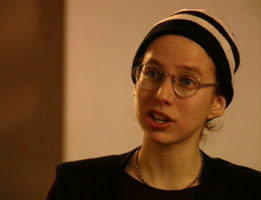 The amateur documentary Lavender Limelight: Lesbians in Film (1997) should've been titled Lesbian Filmmakers, as it's not restricted to any discussion of films with lesbians "in" them.
The amateur documentary Lavender Limelight: Lesbians in Film (1997) should've been titled Lesbian Filmmakers, as it's not restricted to any discussion of films with lesbians "in" them.
The documentary itself is a minimalist effort by Marc A. Mauceri. Since sexuality we're given to believe by this documentary can define a filmmaker, it is an interesting omission of information that the director of the documentary is a straight man. Which for me is actually a relief as I'd hate for dykes to have to take responsibility for such superficial though well-intended piffle.
The clips are not well selected, giving the impression that all the films excerpted are pretty awful, when in reality two of them are worth seeing & one of those two is honestly very good. The main thread of the documentary is stationary interviews with directors who are out as gay women, & who have made their mark, large or small, in independent cinema.
Possibly of interest to would-be independent filmmakers generally, it's really an elementary primer on the outsider art of cinema, & is liable to me much more to the liking of beginner filmmakers than to the apparently targeted audience of gay women.
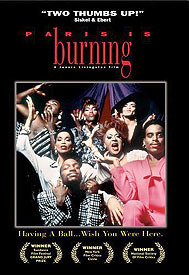 Likely due to the director rather than the individual women interviewed, they come off as having simpleminded politicized notions, with self-assuredness seemingly misplaced if the clips are to judge by, very little depth to any of it. Likely due to the director rather than the individual women interviewed, they come off as having simpleminded politicized notions, with self-assuredness seemingly misplaced if the clips are to judge by, very little depth to any of it.
Only Cheryl Dunne and Rose Troche come off as deeply intelligent & capable; the rest come off as communally insulated, a mite pompous, not half as wise as they believe themselves to be, & unaware that the basis of their minimal fame is the gay community's despiration to see themselves in films no matter how poorly made.
It starts off with an interview with Jennie Livingston, who started making Paris Is Burning (1990) while still ostensibly straight, & came out to herself then the world during the filming.
It's about drag queen balls in the multiracial genderfuck community of New York City as it existed in the late 1980s. The film itself comes off as cheesy & ugly.
The mostly Latino & Black drag queens trusted the white woman with her camera, so a few insights do surface in the film itself, which must be appreciated for what it is, a completely amateur document of a marginalized fetish community.
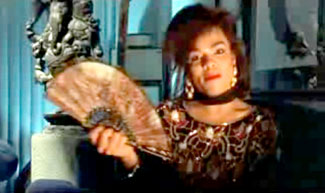 Paris is Burning also documented the origins of the came-and-went fad of "voguing" as a dance style strongly influenced by the bohemian drag community struggling to keep disco relevant beyond its time. Paris is Burning also documented the origins of the came-and-went fad of "voguing" as a dance style strongly influenced by the bohemian drag community struggling to keep disco relevant beyond its time.
In 1990/91 when this film played a few major-city art-cinemas, the drag community was so thrilled to look at itself in the mirror that the movie was a transient cultural phenomenon & many misguided activists thought it should've won an Oscar Award & protested that it wasn't even nominated.
These decades later the physical ugliness of the film & its occupants seems increasingly obvious; it gets downright scary in a "fear of clowns" sort of way. There's no art in any of it but it seriously is an historical document which arose in the vanguard of a self-conscious "Queer Cinema" of the 1990s.br>
Marc's documentary about lesbian filmmakers, however, reveals none of this historical significance, & you'll have to subject yourself to Paris is Burning to really get it. The interview with the waif-like young director shows her (like several of these women) to be serious in intent, kind of sweetly immature at the time of the interview, & leaves very little wonder that she was incapable of following up Paris is Burning with anything that mattered to anyone.
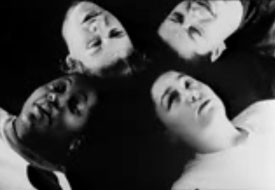 Rose Troche is interviewed about her film Go Fish (1994). It's an attractively filmed black & white hodgepodge, slightly weakened when we are subjected to "rap group" style discussions of topics relevant to lesbians of the 1990s, some issues still relevant but the manner of the discussion is severely dated. Rose Troche is interviewed about her film Go Fish (1994). It's an attractively filmed black & white hodgepodge, slightly weakened when we are subjected to "rap group" style discussions of topics relevant to lesbians of the 1990s, some issues still relevant but the manner of the discussion is severely dated.
It's even so a strong film, with gritty interpersonal relationships, community dykes who look exactly like dykes instead of some movie version.
Adhering to the hodgepodge approach, we get everything from poetry reading to genuinely artistic dream sequences. In her Lavender Limelight interview Rose admits the influence of early James Jarmusche, which is an ideal influence if one's goal in filmmaking is to do art.
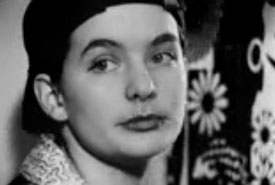 Rose had from the start a firm understanding of guerilla filmmaking, the urge to get it done even without resources, & get it done right. Go Fish was filmed on 16 mm black & white footage & does look like an amateur film, but with real art & integrity. Rose had from the start a firm understanding of guerilla filmmaking, the urge to get it done even without resources, & get it done right. Go Fish was filmed on 16 mm black & white footage & does look like an amateur film, but with real art & integrity.
Instead of the "black outs" James Jarmusch used between major shots in Stranger than Paradise (1984), Troche uses intriguing "pillow shots" of objects, people, hands, each a photographic gem.
The story itself, pretty much just about falling in love & having sex, is slightly exploitation in approach, woman-made-for-women softcore.
A viewer would be very surprised by the evidence of Go Fish if this filmmaker didn't go on to greater successes, & had she not done so, it could easily be chalked up to prejudice. Happily she's had real successes, including work on the cable series The L Word (2004) & the largely mainstream feature The Safety of Objects (2001).
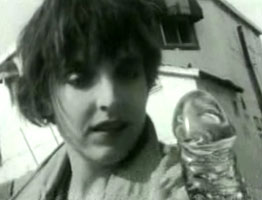 German director of Virgin Machine (Die Jungfrauenmaschine, 1988), Monika Trent talks about s/m sex. Virgin Machine is vulgar, violent sexploitation, but definitely a classic of its kind.
German director of Virgin Machine (Die Jungfrauenmaschine, 1988), Monika Trent talks about s/m sex. Virgin Machine is vulgar, violent sexploitation, but definitely a classic of its kind.
Virgin Machine begins as though it's going to be a gritty quest for true love, varied in sexual possibilities.
But eventually it develops into a genderphucked s/m obsession that will bore who it doesn't alarm, unless the viewer shares the obsession. The story doesn't strike me as essentially a lesbian work or even necessarily a woman's work.
It is has the feeling of being partially a documentary though apparently mostly scripted. One of the stars is Suzie Brite, who I went to see do a live show a great many years ago at an eccentric downtown gallery in Seattle.
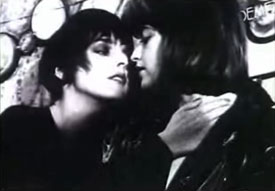 I enjoyed Suzie's lie show quite a lot, as it was permissible to laugh out loud with lots of other women as she did such things as roll onto her back, lifted both her legs & discussed her vagina on display. I enjoyed Suzie's lie show quite a lot, as it was permissible to laugh out loud with lots of other women as she did such things as roll onto her back, lifted both her legs & discussed her vagina on display.
In Virgin Machines we get to listen to Suzie prattle on about dildoes, pretty much as she did in her live show of the same era. Lines like "I like to keep my sex toys clean" can be a hoot if you're watching it with the right friends, but it often feels like a home movie of no real consequence.
Some images of motorcycle dykes are realistic & to this day not common in cinema. The sleezy dyke-bar scenes are amusing. Despite some daring bits & occasional sexiess & humor, I fear Virgin Machine only reminded me of beat-era tawdriness, if not just Ken Anger making something he & he alone could wack off with.
This is really a matter of taste & think it might've suited my taste way back when it was a new film, but it bores me now. If I'd not already seen everything by Ken Anger I might've gone on to check out more of Monika Trent, but I feel like I've seen way more than enough. Anyone who relates to the specific vision will be glad to know there's quite a bit more to track down, though.
Trent herself, as interviewed, is no more interesting than are most pornographers. She states the obvious, nothing more. Again, though, the unseen interviewer whose voice we don't even hear may be at fault for making most of these women look slightly dim.
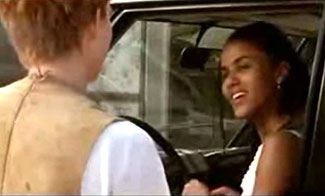 Next up to have the sationary camera propped up in front of her is Maria Gaggenti, a pretty young thang, & director of The Incredibly True Adventures of Two Girls in Love (1995), a tale of school girls, one butchy & working class, the other femme & upper class, falling in love -- a decent enough date movie for young dykes getting to know each other. Next up to have the sationary camera propped up in front of her is Maria Gaggenti, a pretty young thang, & director of The Incredibly True Adventures of Two Girls in Love (1995), a tale of school girls, one butchy & working class, the other femme & upper class, falling in love -- a decent enough date movie for young dykes getting to know each other.
If the Hallmark or Oxygen Channel did Lesbian Appreciation Day once a year, they'd show this soft-and-gentle puff piece. In the mild role-playing & madening gentleness (or tepidity) of the sexuality, there's never a problem that anything could be threatening to preconceived notions about dykes, so it should go down well for the straight folks.
The symbols of this young couple's class standing are idiotic. Evie likes opera, Randy likes rock 'n' roll. Randy works in a gas station, Evie doesn't know how to fix her ritzy-ditzy car. Randy's flunking out of high school because working class kids have no scholarly potential; rich girl Evie is an honor student.
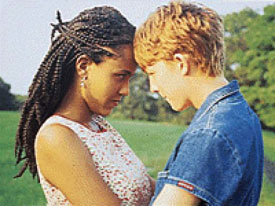 These symbols fail because being a working class gal does not mean you know a lot about cars but are stupid in school, & being a rich girl does not mean youth music has no appeal & math is easy. The fact that the rich girl is black & the poor girl is white is merely a politically correct intrusion. These symbols fail because being a working class gal does not mean you know a lot about cars but are stupid in school, & being a rich girl does not mean youth music has no appeal & math is easy. The fact that the rich girl is black & the poor girl is white is merely a politically correct intrusion.
I thought the whole set-up was just stupid, cliche, sappy, false, safe, & dull, leaving me unsusceptible to this high school romance.
But then, I like love stories when they're transcendently good. I'm not desparate enough to embrace a story of dykes in love even if it is a mediocre film rather badly acted. Others, I realize, will gladly settle.
I'm also peculiar in that relentlessly upbeat stories don't easily appeal to me, though once again, I do understand the majority don't prefer doom & gloom so might really like these sweet gals; & as a film pitched to the choir, it's nice to see the cultural & kitsch trappings of a specifically gay community decorating the film here & there.
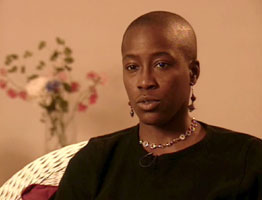 Next up is director Su Friedrich, who made Hide & Seek (1996) semi-documentary or docudrama about being an adolescent lesbian in the 1960s, plus some earlier experimental films. Next up is director Su Friedrich, who made Hide & Seek (1996) semi-documentary or docudrama about being an adolescent lesbian in the 1960s, plus some earlier experimental films.
Though her interview is a mite vapid (I kept blaming the interviewer), Su has filmmaking prowess, & I hope she gets to do more that will actually be seen.
Then there's Heather Lynn MacDonald, director of the documentary Ballot Measure 9 (1995) about anti-gay legisislation attempted in Oregon. No surprise she hasn't done much since. Neither interview is especially interesting.
The best is left for last. Cheryl Dunye's interview has the most to say, little as that may be, & she's hands-down a brilliant filmmaker. I adored her Watermelon Woman (1996) which discusses a bit, & a film that came out later, The Stranger Inside (2001) confirmed her genius.
To some degree the accumulative effect of this "strictly the 'nineties" interview collective gives the impression that that's when queer cinema started. It's not like anyone researched anything, & there are no reference to the likes of Donna Deitch or her first feature Desert Hearts (1986), Lizzy Borden's Born in Flames (1983), or Patricia Rozema's I've Heard the Mermaids Singing (1987).
But with Rose Troche & Cheryl Dunye being both good filmmakers & with opinions & observations of merit, it's probably worth watching Lavender Limelight even though it comes off not a substantive documentary worthy of its own dvd. It more resembles hastily concocted "extras" that most viewers learn not to waste time watching when they rent a disc for the main feature only.<
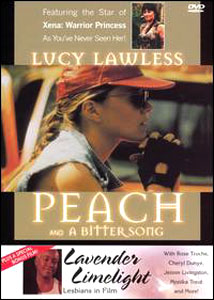 Included with the short documenery are two short-short film, Peach (1995) & A Bitter Song (1990), both featuring Lucy "Xena" Lawless. Included with the short documenery are two short-short film, Peach (1995) & A Bitter Song (1990), both featuring Lucy "Xena" Lawless.
These are as trivial as the documentary, so it probably doesn't matter that the three films together have alternatively been marketed as though Peach were the main film & the other two were extras. They're all just extras, with no main show.
Peachwould be just another justifiably ignored short subject, worse than most, if not for the presence of Lucy Lawless of Xena fame, here playing as a lesbian towtruck driver.
A young Mauri mother (Tania Simon) with dreadlocks gets off the bus & goes into a fruit shop where she salivates over an expensive peach she can't afford.
The vendor takes pity & lets her have one for free. The peach (it seems to me moronically) symbolizes this married woman's desire to rut with the lady truckdriver -- & it's distinctly lust, not love, since she doesn't even know the woman's name.
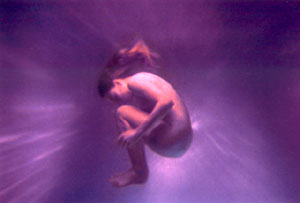 After a few slightly interesting exchanges with her mother & husband (Esther David & Joel Tobek), the two women finally share the peach as though it were the forbidden fruit of Eden. That's it. A trivial character study with no real pay-off. After a few slightly interesting exchanges with her mother & husband (Esther David & Joel Tobek), the two women finally share the peach as though it were the forbidden fruit of Eden. That's it. A trivial character study with no real pay-off.
Director Christine Parker is definitely talented, though the better evidence of it is Channelling Baby (1999), an intense dramatic feature film, though not queer cinema related.
Peach just doesn't rise above the level of banality, whether or not it seemed "radical" in 1995 to suggest Mauri women can be gay when they begin to think about cheating on their husbands. But Parker's Channelling Baby was an extravagant leap forward for her, an excellent & unusual drama.
A young ditzy hippie chick, Bunnie (Danielle Cormack), loses contact with her daughter for twenty years after her husband (Kevin Smith) just up & leaves with the kid.
During the long separation, Bunnie went blind, & is assisted by a woman claiming psychic powers & her nutsack brother (Amber Sainsbury & Joel Tobeck) in finding her husband & daughter. It slowly comes together what really happened to instigate the separation. The eccentricity of the characters makes this a very fine film about loss, misunderstanding, & rediscovery.
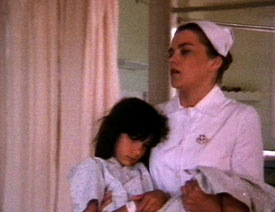 A Bitter Song is another New Zealand short, partially subtitled because the main characters are Greek immigrants. A Bitter Song is another New Zealand short, partially subtitled because the main characters are Greek immigrants.
Lucy Lawless plays a doctor but the story isn't about her. Thalia is a young girl with a lump on her leg. The doctor checks it out, & it ain't good. Part of the short is about her hospital stay.
The meat of it, however, is Thalia's eerie dreaming. There's a suicidal sensibility to these dreams which always turn to nightmares of her father doing something that risks terrible injury to Thalia.
By the time the psychological potrait is completed, it seems fairly likely she is being molested by her dad, & the last shot of the film has considerable power.
A disturbing film, & certainly the best of the three, but one has to be prepared for unpleasantry. The director clealy has talent & too bad she has done so little since. Her first feature film is the serious kiwi drama Jinx Sister (2008) which I've yet to see.
copyright © by Paghat the Ratgirl
|
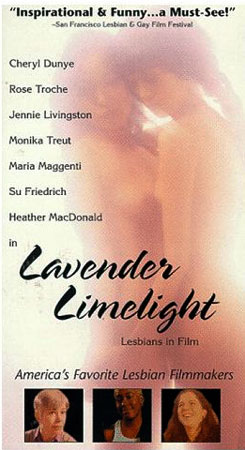

 Likely due to the director rather than the individual women interviewed, they come off as having simpleminded politicized notions, with self-assuredness seemingly misplaced if the clips are to judge by, very little depth to any of it.
Likely due to the director rather than the individual women interviewed, they come off as having simpleminded politicized notions, with self-assuredness seemingly misplaced if the clips are to judge by, very little depth to any of it. Paris is Burning also documented the origins of the came-and-went fad of "voguing" as a dance style strongly influenced by the bohemian drag community struggling to keep disco relevant beyond its time.
Paris is Burning also documented the origins of the came-and-went fad of "voguing" as a dance style strongly influenced by the bohemian drag community struggling to keep disco relevant beyond its time.
 Rose had from the start a firm understanding of guerilla filmmaking, the urge to get it done even without resources, & get it done right. Go Fish was filmed on 16 mm black & white footage & does look like an amateur film, but with real art & integrity.
Rose had from the start a firm understanding of guerilla filmmaking, the urge to get it done even without resources, & get it done right. Go Fish was filmed on 16 mm black & white footage & does look like an amateur film, but with real art & integrity.
 I enjoyed Suzie's lie show quite a lot, as it was permissible to laugh out loud with lots of other women as she did such things as roll onto her back, lifted both her legs & discussed her vagina on display.
I enjoyed Suzie's lie show quite a lot, as it was permissible to laugh out loud with lots of other women as she did such things as roll onto her back, lifted both her legs & discussed her vagina on display.
 These symbols fail because being a working class gal does not mean you know a lot about cars but are stupid in school, & being a rich girl does not mean youth music has no appeal & math is easy. The fact that the rich girl is black & the poor girl is white is merely a politically correct intrusion.
These symbols fail because being a working class gal does not mean you know a lot about cars but are stupid in school, & being a rich girl does not mean youth music has no appeal & math is easy. The fact that the rich girl is black & the poor girl is white is merely a politically correct intrusion.

 After a few slightly interesting exchanges with her mother & husband (Esther David & Joel Tobek), the two women finally share the peach as though it were the forbidden fruit of Eden. That's it. A trivial character study with no real pay-off.
After a few slightly interesting exchanges with her mother & husband (Esther David & Joel Tobek), the two women finally share the peach as though it were the forbidden fruit of Eden. That's it. A trivial character study with no real pay-off. A Bitter Song is another New Zealand short, partially subtitled because the main characters are Greek immigrants.
A Bitter Song is another New Zealand short, partially subtitled because the main characters are Greek immigrants.